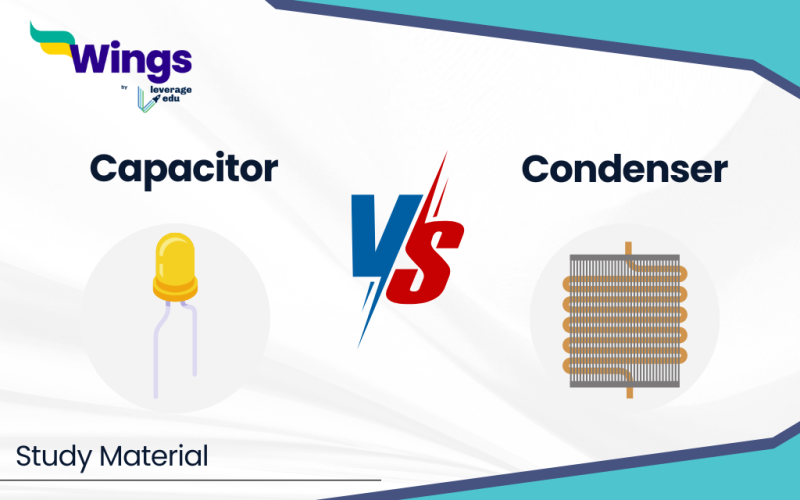The difference between Capacitor and Condenser is that capacitors are electronic elements whose energy is surrendered to the element that turns into the electric field. On the other hand, the condenser is a device that represents a device whose energy is turned into an electrostatic field. To know the difference between a capacitor and a condenser in detail, you can read the given article.
Table of Contents
What is a Capacitor?
A capacitor is an electronic component that is used as an electrical energy reservoir. It stores electrical charge by collecting it on two closely spaced conductors, it is often called as plates. It is separated by a dielectric. This is a design, where two parallel metal plates are away by a non-conductive dielectric. The capacitance, or the ability to store electrical charge, is directly influenced by the properties of the dielectric material. Therefore, the dielectric is based on the capacitance and the physical size restricts the capacitor.
What is a Condenser?
A condenser is a device that transforms a gaseous substance into its liquid form. These condensers achieve this through a cooling system to remove heat from the gas. They play an important role in various applications such as thermal power plants, air conditioning systems, and even distillation processes.
Also Read: What is the Difference Between Regulated and Unregulated Power Supply?
What is the Difference between Capacitor and Condenser?
There is a huge difference between a capacitor and a Condenser. Capacitors have the major electronic elements and can easily store electrical charge. However, it also omits the passage of AC through them. Whereas, Condenser is a term that is used in various senses. In the mechanical sense, the condenser can be termed as vapor to water.
It is basically an optical system that focuses on a broad light beam to a narrow light beam. Energy in the capacitor is stored in the electrostatic field. To understand the difference between these two terms in more detail, you can observe the following table of differences between capacitors and condensers.
Capacitor Vs Condenser
| Particulars | Capacitor | Condenser |
| Definition | A capacitor is an electronic component that is used as an electrical energy reservoir. | A condenser is a device that transforms a gaseous substance into its liquid form. |
| Electrical Function | Stores electrical charge in an electric field. | Not used in modern electrical sense. |
| Modern Usage | Widely used term for electrical energy storage. | The rarely used term, |
| Energy Conversion | The energy which is given to an element turns into an electric field. | This energy is surrendered into an electrostatic field. |
| Use | It is used for signal coupling, decoupling, filtering, motor starting, and others | It refers to gas-to-liquid conversion. |
Application of Capacitor in Real-Life
There are various uses of a capacitor in real life like noise filtering, coupling, and decoupling systems. The capacitors are an important function in various applications, they are to be used in a wide range of industries. There are various capacitor applications like energy storage, filtering, timing, and power factor correction in electronic devices and electrical systems.
Related Blogs
FAQs
A capacitor is an electronic component that is used as an electrical energy reservoir.
A condenser is a device that transforms a gaseous substance into its liquid form.
Yes, when the battery of a mobile phone is being charged, the capacitors in the phone balance the power supply to all the components.
This was all about the “difference between capacitor and condenser”. For more such informative blogs, check out our Study Material Section, you can learn more about us by visiting our Indian exams page.
 One app for all your study abroad needs
One app for all your study abroad needs













